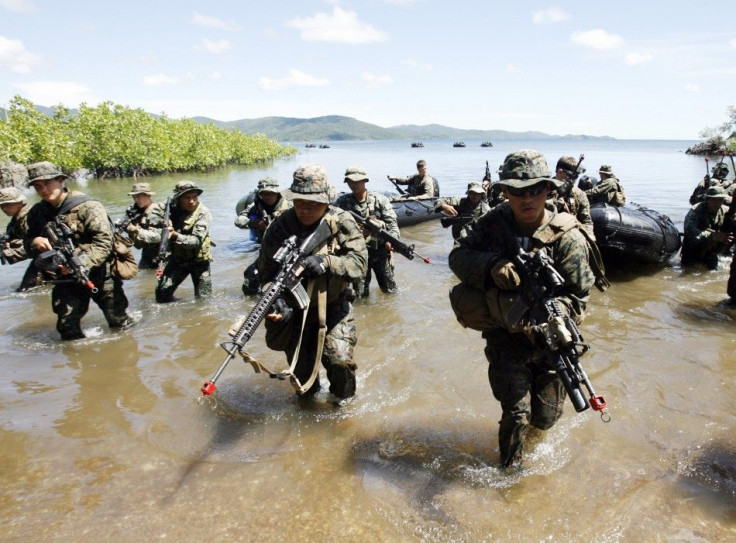South China Sea Dispute Expected To Set Tone For ASEAN Meet

The territorial dispute in the South China Sea is expected to drive the talks during the 19th ASEAN Regional Forum (ARF) beginning Monday in Cambodia. The confrontational rhetoric between China and the U.S. over the South China Sea will also form the focus of the discussions that will be attended by top officials from the 10 member nations.
U.S. Secretary of State Hillary Clinton and Chinese Foreign Minister Yang Jiechi will meet in Phnom Penh for the ARF meeting later this week along with delegates from the other 25 invited nations to reach a resolution to end the geopolitical tension in the region.
Clinton has called for ''progress'' on reaching a code of conduct for the South China Sea and has urged China and the ASEAN nations to resolve their disputes without coercion, without intimidation, without threats and without conflict.
China's growing maritime influence in the region has neighboring nations, including Brunei, Malaysia, Vietnam and Taiwan, worried over territorial confrontations. Beijing lays claim to almost the entire South China Sea, including what is recognized by the U.N. as the Exclusive Economic Zone of other neighbors, according to reports.
The Philippines, which was involved in a tug-of-war with China recently over the ownership of the Scarborough Shoal, has been seeking ASEAN's support in pressurizing Beijing to accept the code of conduct.
The U.S. has maintained that Washington would act to counterbalance China's growing influence in the South China Sea as part of its foreign policy known as pivot to Asia, developed in the aftermath of the wars in Iraq and Afghanistan.
Although China, Taiwan and the Philippines have long been involved in the South China Sea dispute, the recent standoff was triggered April 10 when two Chinese ships thwarted the Philippines's effort to arrest several Chinese fishermen accused of illegally entering and poaching near the Scarborough area.
Recent military drills, involving nearly 7,000 U.S. and Philippine forces, intensified the standoff which led to a top military publication in China warning that the U.S. may be risking an armed confrontation by undertaking joint military drills with the Philippines.
To de-escalate the situation, Philippine President Benigno Aquino III pulled out a warship from the region April 16 while a spokesperson of the Chinese embassy in Manila said that despite tensions over the disputed shoal, both sides agreed not to do anything to complicate or aggravate the situation.
In an article published in November in the Foreign Policy magazine, titled America's Pacific Century, Clinton said that the future of politics will be decided in Asia.
In the next 10 years, we need to be smart and systematic about where we invest time and energy, so that we put ourselves in the best position to sustain our leadership, secure our interests, and advance our values, Clinton wrote. One of the most important tasks of American statecraft over the next decade will therefore be to lock in a substantially increased investment -- diplomatic, economic, strategic, and otherwise -- in the Asia-Pacific region.
The United States' shift in strategic focus to the east and its entry into the South China Sea issue has provided the Philippines with room for strategic maneuver, and to a certain extent increased the Philippines' chips to play against us, emboldening them to take a risky course, the Liberation Army Daily, the chief mouthpiece of China's military, was quoted by Reuters.
Despite Washington's stance that the strategic shift in the U.S. foreign policy is not targeted at Beijing, Leon Panetta's plan to focus on the South China Sea dispute at the annual Shangri-La Dialogue in Singapore in June, known as an indispensable forum for Asian defense diplomacy, had raised certain concerns among Chinese officials.
China's Foreign Ministry spokesman Liu Weimin said in early June that China hoped the U.S. would play a positive and constructive role in the region, state-run Xinhua news agency reported.
We also hope the U.S. will respect China's interests and concerns in the region,'' he added.
Analysts say the South China Sea is increasingly being considered as something akin to the Persian Gulf. Aside from the issue of sovereignty, energy security is also a major factor behind these competing claims, veteran Filipino journalist Chito Sta. Romana writes. He says growing tensions between China and the U.S. in the Asian region provide a strategic context that complicates the regional situation, adding that it is difficult to expect an end to this diplomatic tug-of-war in the near future.
© Copyright IBTimes 2025. All rights reserved.






















